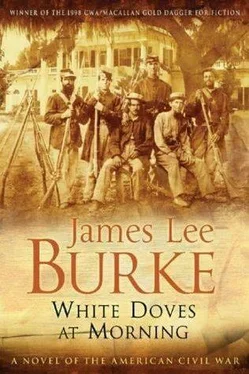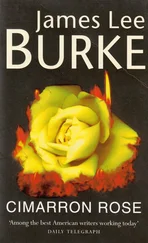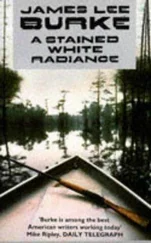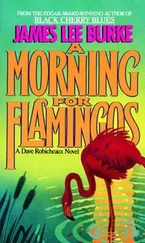"Flower?" he said.
He heard her rise from her bed, then push open the wood flap on the window with a stick.
"What you doing, Mr. Willie?" she asked.
"Did Rufus Atkins come upon the poetry book I gave you?"
"Yes, suh, he did."
"Did he report you?"
"No, suh, he ain't done that. I mean, he didn't do that."
"Come close, so I can see your face."
"You don't sound right, Mr. Willie," she said.
"Did Rufus Atkins make you do something you didn't want to?"
"I ain't got no control over them things. It don't do no good to talk about them, either."
"I've done you a great harm, Flower."
"No, you ain't. I mean, no, you hasn't. You better go back home now, Mr. Willie."
He was about to reply when he heard horses out on the road.
"Who's that?" he said.
"The paddy rollers. Oh, suh, please don't let them catch you here," she said.
He walked back through the yard and the darkness of the oaks that grew on each side of the laundry. He was sweating now, the wind suddenly cold on his face. He heard thunder crack in the south and rumble across the sky, like apples tumbling down a wooden chute. He stepped out on the road and walked toward the lights in the saloon and the tinny music in Carrie LaRose's brothel, his pulse beating in his wrists, his palms damp, a tightness in his throat he could not quite explain.
There were six riders spread across the road in front of him, led by a seventh man in a rain slicker and flop hat, like cavalry advancing on an enemy position, their saddles hung with pistols and coils of rope and braided whips, their faces bladed with purpose.
"Hold your hands out by your sides, friend," the leader said.
"I think not. Unless you have governance over a white man talking a walk," Willie said.
The leader rode his horse forward. Lightning rippled through the clouds overhead and the wind flattened the tops of the young cane in the fields. The leader of the horsemen leaned down on his pommel, the saddle creaking with the shift in his weight.
"We've got five niggers unaccounted for tonight. It isn't a time for cleverness, Mr. Willie," he said.
"Oh, it's Captain Atkins, is it? This is a coincidence. I'm on a mission of recovery myself. I took my laundry to the Black girl, whats her name, Flower, the one owned by Mr. Jamison? I think I dropped one or two of my books out of my saddle bags.You didn't find them did you?"
"Maybe you and I will have a talk about that later," Atkins said.
"Mr. Jamison often visits at the Shadows. I'll mention it to him. Is there anything I should report about amorous relationships on your part with his niggers?" Willie said.
Atkins' ringed finger clicked up and down on the stitched top of his pommel.
"A word of caution to you, Mr. Willie. You were at the home of the abolitionist woman this evening. Now I see you in a neighborhood where five slaves didn't report for bell count. Be aware there are others besides I who feel you bear watching," Atkins said.
"Say again?"
"Robert Perry saved his little tit-sucking momma's boy of a friend from being gagged and bucked today. Don't expect that kind of good fortune again," Atkins said.
"Thank you, sir. It's a great honor to be excoriated by a miserable fuck and white trash such as yourself," Willie said.
He brushed past Atkins' horse and walked through the other riders, the cane in the fields whipping in the wind, dust and rain now blowing across the lighted front of the saloon.
He heard Atkins' boot heels thud against his horse's sides and barely had time enough to turn before Atkins rode him down, whipping the lead ball on the butt of his quirt handle across Willie's head.
He felt the earth rush up at him and explode against his face. Then the booted legs of the paddy rollers surrounded him and through a misting rain he thought he heard the song "Dixie's Land" again.
"Since he likes the abolitionist woman so much, dump him in the nigger jail," Atkins said.
Then Willie was being lifted over a saddle, his wrists and feet roped together under the horse's belly. As the horse moved forward blood dripped out of Willie's hair onto his shirtsleeves and the dust from the horse's hooves rose into his nostrils.
But a huge man stepped into the middle of the road and grasped the horse's bridle.
"You're a constable and I cain't stop you from taking him in, Mr. Atkins. But if there's another mark on him in the morning, I'm gonna strip the clothes off your body on Main Street and lay a whip to your back, me," Jean-Jacques LaRose said.
Atkins was dismounted, his stature diminutive in contrast to Jean-Jacques LaRose. He pressed his quirt against Jean-Jacques' chest, bowing the braided leather back on itself.
"Would you care to see your sister's business establishment shut down?… You don't?… I knew you were a man of reason after all, Jack," he said. He tapped his quirt softly on Jean-Jacques' chest.
A half hour later Willie lay on a wood bunk inside a log jail, an iron manacle around his ankle. Two Negroes sat on the dirt floor against the far wall, barefoot, their knees drawn up before them. Their clothes were torn, their hair bloody. They smelled of funk and horse barns and night damp and fish that had soured on their stomachs. He could hear them breathing in the dark.
"You men ran from your owners?" Willie asked.
But they would not answer him. In the glow of the moon through the barred window their faces were running with sweat, their eyes red, their nostrils cavernous. He could see the pulse jumping in one man's throat.
He had never seen fear as great in either man or beast.
LATER that same night Flower left her cabin and crossed the cane field through layers of ground fog that felt like damp cotton on her skin. She entered a woods that was strung with air vines and cobwebs and dotted with palmettos and followed the edge of a coulee to a bayou where a flatboat loaded with Spanish moss was moored in a cluster of cypress trees.
The tide was going out along the coast. In minutes the current in the bayou would reverse itself, and the flatboat, which looked like any other that was used to harvest moss for mattress stuffing, would be poled downstream into a saltwater bay where a larger boat waited for the five black people who sat huddled in the midst of the moss, the women in bonnets, the men wearing flop hats that obscured their faces.
Two white boatmen, both of them gaunt, with full beards, wearing leather wrist guards and suspenders that hitched their trousers almost to their chests, stood by the tiller. One of them held a shaved pole that was anchored in the bayou, his callused palms tightening audibly against the wood.
A white woman with chestnut hair in a gray dress that touched the tops of her shoes had just walked up a plank onto the boat, a heavy bundle clasped in both arms. One of the white men took the bundle from her and untied it and began placing loaves of bread, smoked hams, sides of bacon and jars of preserves and cracklings inside the pilothouse.
Flower stepped out of the heated enclosure of the trees and felt the coolness of the wind on her skin.
"Miss Abigail?" she said.
The two white men and the white woman turned and looked at her, their bodies motionless.
"It's Flower, Miss Abigail. I work at the laundry. I brung something for their trip," she said.
"You shouldn't be here," Abigail said.
"The lady yonder is my auntie. I known for a long time y'all was using this place. I ain't tole nobody," Flower said.
Abigail turned to the two white men. "Does one more make a difference?" she asked.
"The captain out on the bay is mercenary, but we'll slip her in," one of them said.
"Would you like to come with your auntie?" Abigail asked her.
Читать дальше












